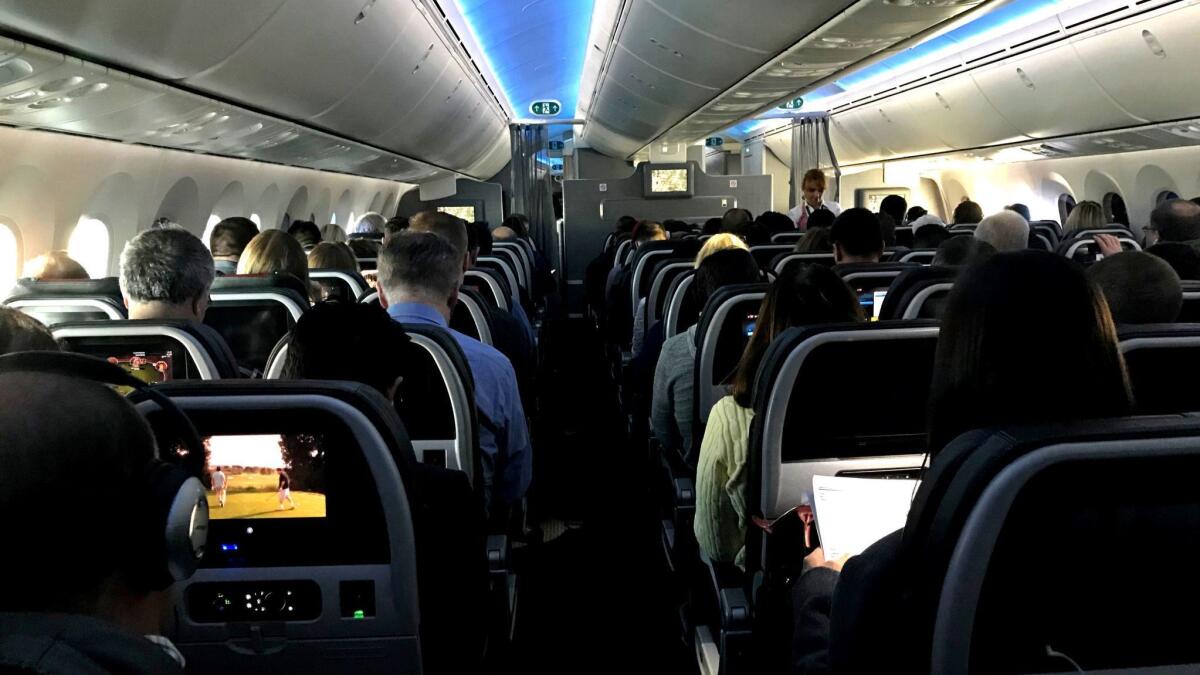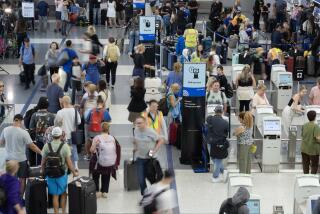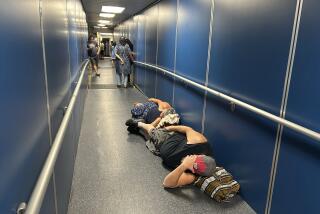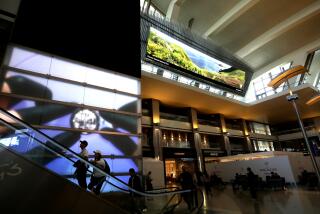Airport workers say they lacked training and gloves to clean planes amid coronavirus

- Share via
Terrified about the coronavirus outbreak, airline worker Barbara Gomez refused her supervisor’s order to clean the interior of an American Airlines plane when it arrived from China at Los Angeles International Airport.
Gomez, a cabin attendant for JetStream Ground Services, said she was given no gloves or a mask before being told to help wipe down the interior of the plane.
“Everybody is concerned about the virus,” she said of the incident in late January. “We don’t have anything to protect us.”
With the outbreak claiming more than 3,000 lives around the globe, the risk of being infected is on everybody’s mind, especially airline and airport workers such as Gomez and her colleagues, who say they have been forced to choose between their jobs and possibly being exposed to the virus.
Over the weekend, an American Airlines flight from New York’s John F. Kennedy International Airport to Milan, Italy, was canceled because the flight crew refused to fly to the region that had recently reported an outbreak of the virus. After the cancellation, American Airlines suspended its two daily flights to Milan from New York and Miami until April 25.
An LAX screener of incoming flights from China and surrounding countries tested positive for the COVID-19 virus March 3. The screener so far has a mild case and is isolated at home.
The plight of the LAX workers was raised during a discussion of the coronavirus outbreak at a meeting of the Los Angeles City Council on Wednesday. Airport executives told the council that they were aware of the complaints from the cabin cleaners but did not have the authority to require airport contractors to provide workers gloves or other equipment.
“We do not dictate how they mandate the cleaning of the planes,” said Justin Erbacci, interim chief executive of Los Angeles World Airports.
But Councilman Mike Bonin said he was not satisfied and instructed airport officials to report back to the council on ways to ensure that airport contractors comply with worker training requirements.
“We can’t just take their word on it,” he said.
A 2017 Los Angeles ordinance requires all airport employees, including those who work for a contractor at LAX, to undergo 16 hour of emergency response training to teach workers the definition and effects of “hazardous materials” and “infectious diseases,” among other subjects. Gomez and several of her co-workers said they don’t recall undergoing such training.
Bonin asked Muntu Davis, the Los Angeles County health officer, if the cabin cleaners could have been exposed to the virus. “That’s a possibility,” he replied.
Several JetStream employees also took their grievances to the city’s Bureau of Contract Administration on Feb. 19, but an agency spokeswoman said the bureau has jurisdiction to investigate only wage disputes. The Florida company cleans airplanes and handles cargo at 20 of the nation’s busiest airports, working for American, Delta, United and Southwest airlines.
“We were just being thrown out there without the tools we needed,” said Miguel Covarrubias, who has worked for JetStream for 10 months.
Calls and emails to JetStream were not returned. In an interview with NPR, JetStream President Marc Desnoyers said his employees have been given the proper equipment and training to do the job.
“Provisions of cleaning solutions, gloves and all necessary safety equipment, including masks when requested, are closely monitored and replenished when needed,” he told NPR. “When a concern is raised by a team member, we work to address it immediately, as we did with this employee.”
A spokesman for LAX said the airport was not aware of the complaints.
In a statement, American Airlines said: “American Airlines’ vendor management team works in close partnership with all of our vendors, including JetStream, to ensure the health and safety of everyone in the airport environment.”
Before the outbreak, Los Angeles was one of the nation’s top ports of entry for Chinese tourists and business executives, drawing 1.2 million visitors from China in 2018. That all changed after most of the country’s largest carriers suspended flights from China, Hong Kong and Macau, and the Trump administration barred entry of most foreign nationals who had recently visited China.
Before the flights from China were halted, Gomez and her co-workers said they were ordered to clean several inbound American Airlines planes without adequate training or equipment. The workers said they complained to their supervisors who occasionally provided them with gloves but other times urged them to remove gloves from the supply kept in the galleys of the planes for use by flight attendants when preparing and serving food.
“We had to take gloves from the aircraft,” said Jeanine Reese, a JetStream employee from Inglewood.
If workers refused to clean a plane, Reese said, supervisors reprimanded them for being insubordinate.
Gomez said that after she refused to clean the American Airlines plane in January, she persuaded her supervisor to reassign her to another plane, explaining that she suffered from asthma and bronchitis and would be more vulnerable to the coronavirus.
“I was the first one to speak up because of my condition with asthma and bronchitis,” she said. “I told my manager ‘No.’ I was very scared.”
Reese and other workers who said they could not refuse to clean several flights from China worried later that they could be infected with the virus.
“We told our managers and one of them said, ‘Don’t even worry about it. That’s in China, not in L.A.,’” said Jose Hidalgo, a JetStream employee from Gardena.
More to Read
Inside the business of entertainment
The Wide Shot brings you news, analysis and insights on everything from streaming wars to production — and what it all means for the future.
You may occasionally receive promotional content from the Los Angeles Times.











